Lifestyle
Do you know the feeling when you want to watch a movie but spend too much of your precious time not knowing which to choose? Do you? Excellent! Then, you are at the right place!
For you, through the edition of the Seventh art, we search movies and TV shows. This time we present 'Tenet' (2020) by Christopher Nolan. Starring John David Washington, Robert Pattinson, Elizabeth Debicki, and Kenneth Branagh.
This newest Christopher's mind game movie follows a secret agent (we do not know his name initially; played by John David Washington) who embarks on a personal mission to prevent World War III. He got caught in an unsuccessful SWAT mission, after which he tries to commit suicide (so he can show his loyalty) by swallowing the fake suicide pill. The protagonist wakes up on the boat, and an unknown superior enlists him for a battle to save the world. It's one that will be fought with reverse shooting, time-traveling, and many more.
Time is a luxury that can be easily spent. Nolan shows us how someone can benefit from bending the rules. That traditionally leads to a battle between good and evil, but it is shown in an untraditional way. This fantastic sci-fi action doesn't forgive if you blink for too long. You have to be focused, or you may lose the plot.
Easily one of the best films of 2020 but it can kind of leave you with a headache for attempting to understand the storyline. Personally, that makes the film even better. Pressing pause and saying, 'Whaaaat?' doesn't happen that often. As it is displayed in the movie - '...Just feel it!'. For some time, we can only 'feel' the movie because we won't understand what's happening until the near end. That's not the problem because acting is on point - especially the main antagonist Sator (Kenneth), a stylish but brutal Russian millionaire willing to do anything to get what he wants. He's that villain who will end the world with his family as casualties.
Oh, yeah! Did I mention that the film lasts two and a half hours? It will keep you busy in your thoughts. The only problem is the fact that you need to prepare yourself for this movie. You must be present; it's not something that you watch to relax. It will get you angry and happy at the same time. Well, it is Christopher Nolan's movie. Feel intrigued?
A film to watch! Prepare your popcorn and a nice drink and enjoy for almost three hours. Perfect for a Sunday afternoon, to keep your mind in training for the coming week.
November 29, 2020 - Is the development of Montenegro as a maritime and coastal country spontaneously or strategically planned? What is the maritime traffic pressure on the sensitive ecosystem of the Bay of Kotor? The year 2020 allows us to take a break. And to look at the relationship with the sea as the most crucial development resource of our country.
Boka is known as one of the most beautiful bays in the world, but due to its fjord-like shape that slows down the exchange of water masses it is one of the most sensitive ecosystems of the generally endangered Mediterranean Sea. In recent years, it has been under significant pressure, as it is known as one of the most popular cruising and yachting destinations, which has led to accelerated but completely uncontrolled development.
The most impressive users of the waters of the Bay of Kotor are certainly cruise ships, of which an increasing number have been coming in recent years. But there is also a vast number of yachts, sailboats, speedboats, motorboats, and jetskis. The construction of a seaplane port in Petrovići near Krašić has also been announced. Of course, sailors, rowers, divers, fishers- all of them count on Boka as well.
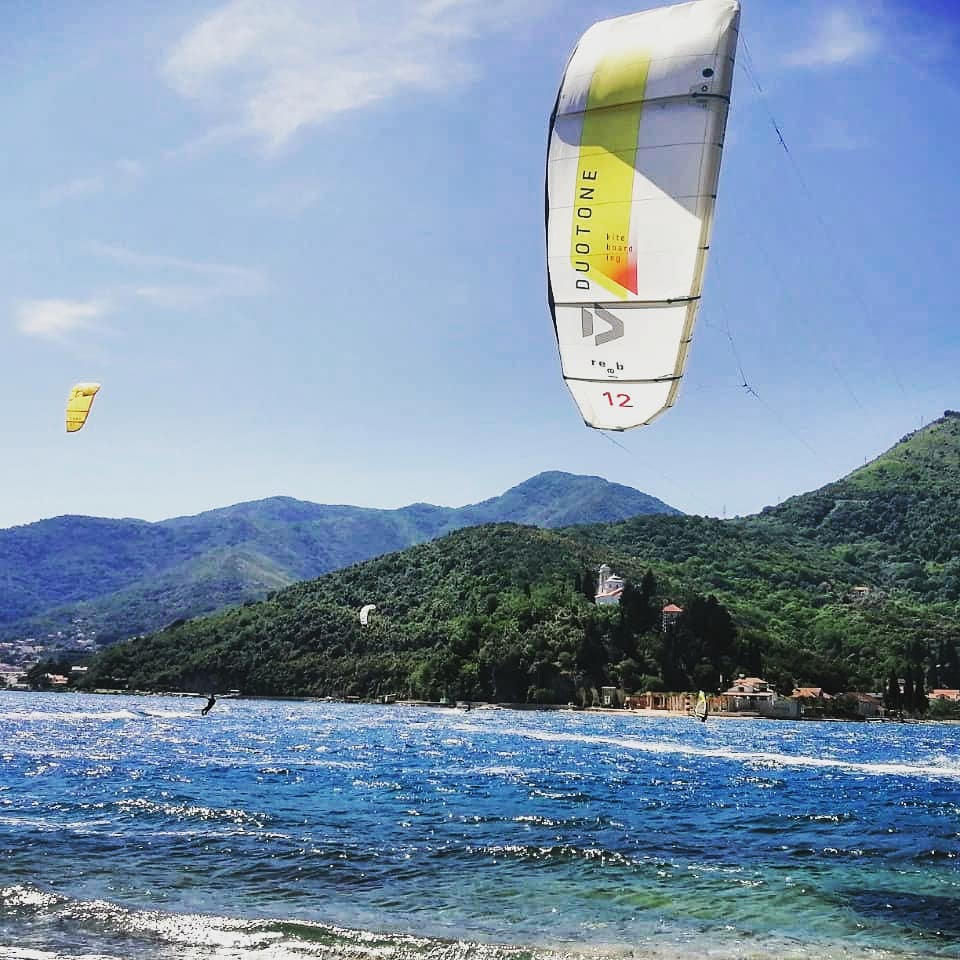
Illustration, Source: Boka Surf FB
Is there room for everyone? How to respond to the wishes and needs of all stakeholders while preserving the sea and life in it? Integral planning, I guess. But we still do not have such plans on the horizon.
The year we will soon see off has brought vast changes in all fields. The negative economic impact of the crisis the COVID pandemic has brought us has affected almost all crucial spheres of the Montenegrin economy. But the absence of the tourist season, or maritime traffic reduced by more than 80 percent, delighted fish and crabs. Dr. Mirko Đurović, an expert on marine mammals from the Institute of Marine Biology, explains:
"Until 2020, we can freely say that there was a lot of pressure when it comes to maritime traffic, a large number of cruise ships, motorboats, yachts, speedboats, jetskis, everything we see during the summer. This year we did not have a tourist season. This was unfortunate, as a large part of the population survives on tourism, but in terms of the natural environment, this was a nice break, as far as the Bay of Kotor is concerned. I am sure that people have also noticed that the seawater is much more transparent, that the water is cleaner, visually, and we will see how things will go further. It will probably go back to normal when this whole corona situation is resolved."
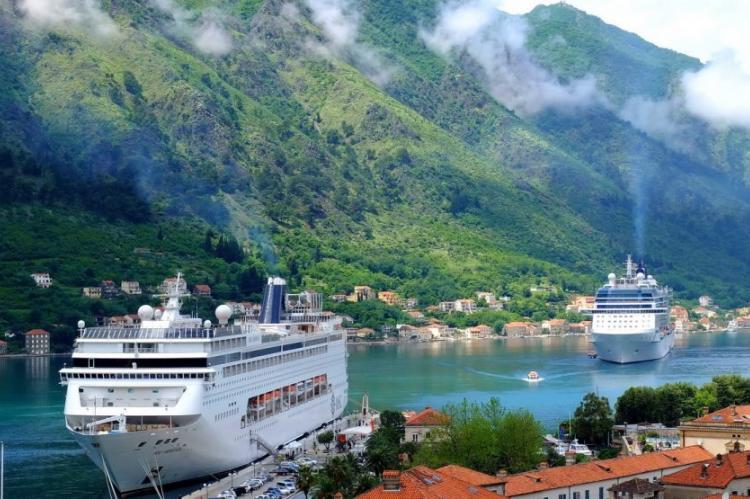
Cruise Ships in Kotor, Source: FOS Media
We must find a balance between economic interests and the need to protect the environment, is the message of a journalist specializing in reporting on the sea and maritime affairs, Siniša Luković:
"If we could see anything positive from this situation with COVID, it is that we had the opportunity to compare this year when there was almost no maritime traffic, during the summer months in the Bay of Kotor compared to what we had in previous years. And we saw how chaotic the situation was. It is obvious it a million ways, but we may see the best answer through the recovery of the marine biosphere and life in the sea in general. You have seen that much larger quantities of fish have returned, more marine mammals, that the sea is much cleaner, that the whole environment is healthier. Last year we had chaos in some respects, this year the complete opposite has been the case. We have to find some balance in between to work with each other."
There are a large number of problems when it comes to maritime traffic in Boka, says the captain of the long voyage and naval pilot, Rajko Čavor:
"We do not have defined waterways, we are deprived of many other solutions that are implied in regulated maritime countries. I've been a pilot for twenty-something years. All this time, I have been trying to help us sit down and define rules that will apply once and for all. WIth the way we do it now, we currently have an unsettled situation at sea and general savagery."
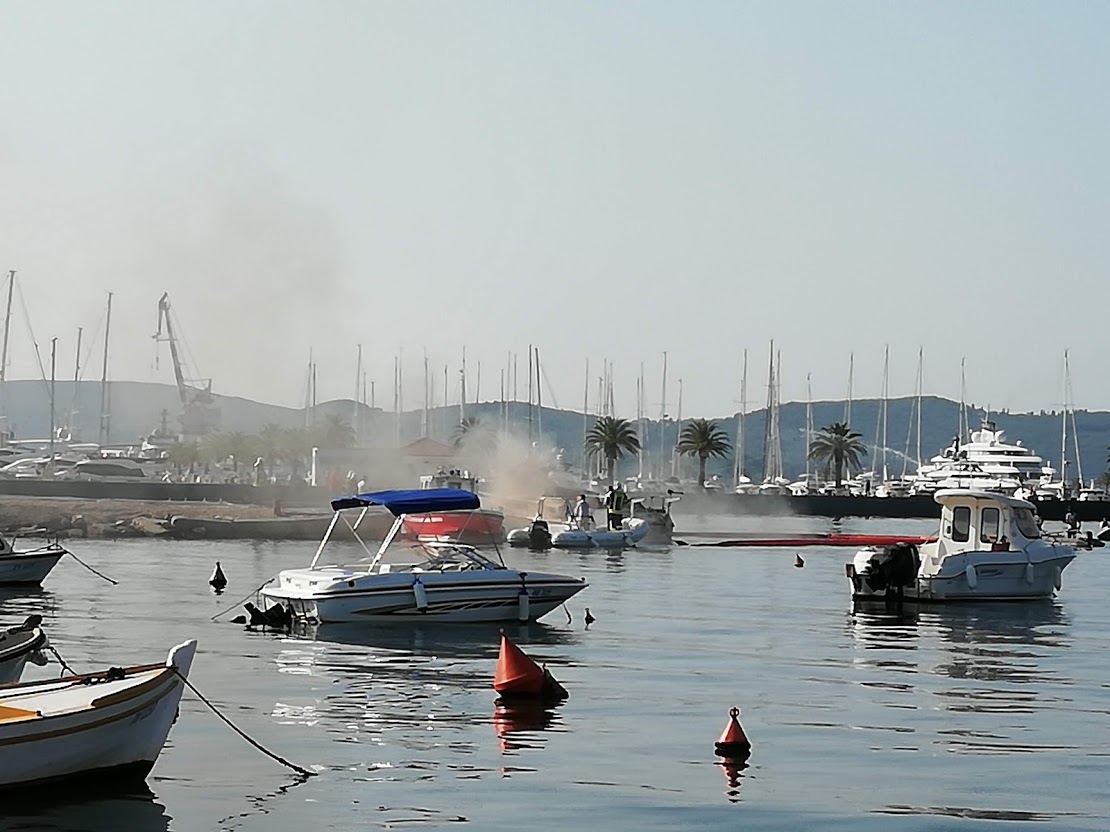
Firefighting intervention, Porto Montenegro, 2018, Photo by Antonela Stjepčević
Let us ignore the incomprehensible fact that the Environmental Protection Agency does not have a sector, not even a single expert, that specifically deals with the sea as an environment. Žarko Lukšić from the Maritime Safety Administration explains which institutions are responsible and included in the system for the protection of the Boka waters:
"The Ministry of Transport and Maritime Affairs, the Ministry of Defense, and the Ministry of Interior formed a joint operational team, which united funds related to marine pollution and search and rescue at sea. A national emergency response plan has been developed. Its revision is in progress, and we expect that plan to be changed by the end of the year, to include the oil plants that are planned for next year.“
Regarding the legal regulations, besides national legislation, our country is a signatory to 15 international directives, conventions, and resolutions, among which the most important is the MARPOL Convention for the Protection of the Sea against Pollution from Ships.
In addition to the Maritime Safety Administration, the Ministry of Transport and Maritime Affairs also has the Port Authority, the Port Authorities of Kotor and Bar, and the Maritime Safety Inspectorate. As Luksic stated, the border police and the Ministry of Defense are included in the control system. However, only one navigation safety inspector is responsible for the entire area from Kotor to Jaz. Inspector Željko Lompar:
"When you look at the safety of navigation through the Bay of Kotor, which is our joint task, not only of the safety inspection but of all citizens, we can freely say that it is exceptional, although I am the only inspector involved. The situation is difficult. It is legally almost impossible to find a colleague. The competition remains open to any engine manager or naval captain who has a Faculty of Maritime sciences. The Safety and Navigation Inspectorate would be so happy to send such a person to carry out inspection work."
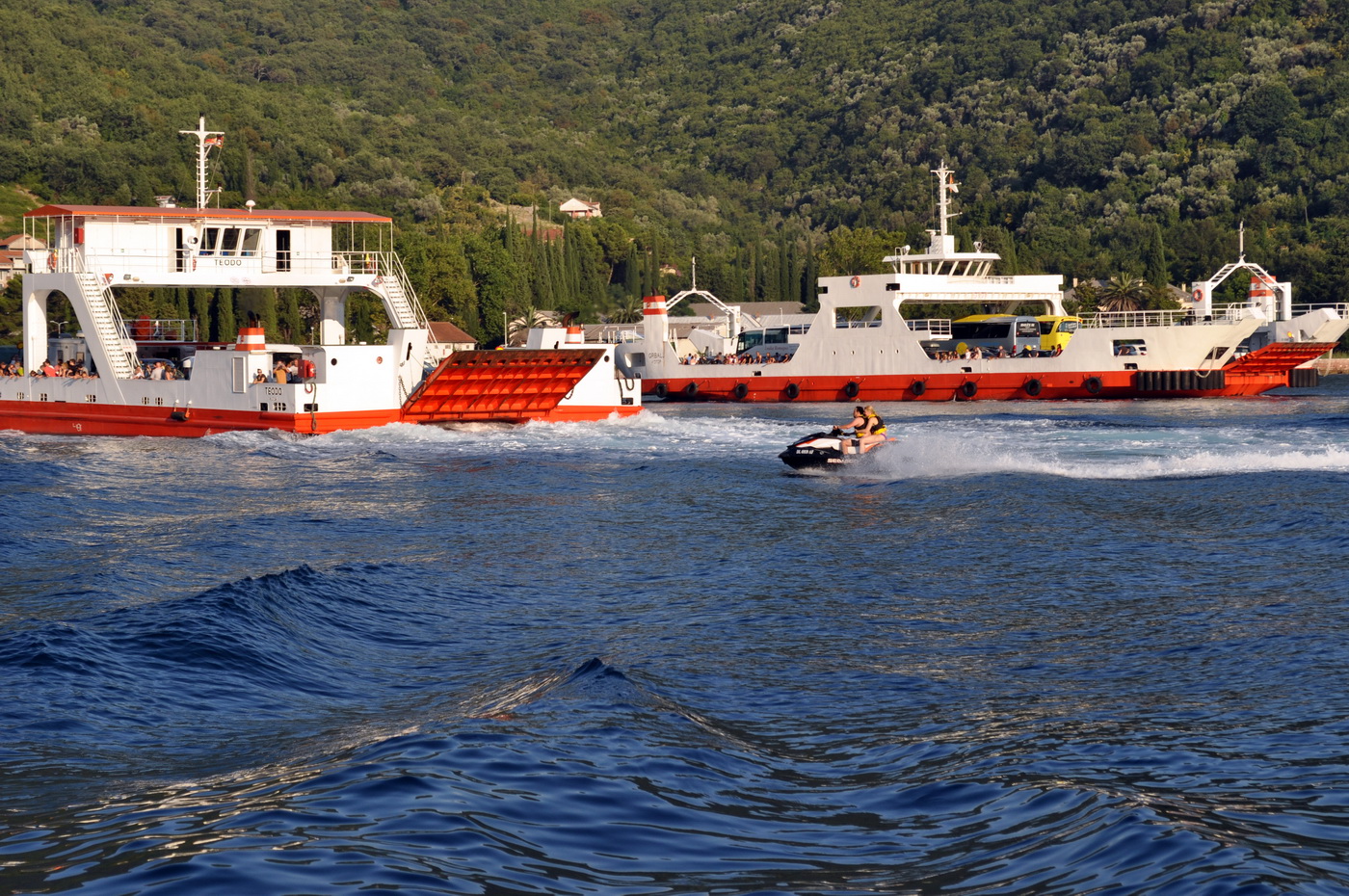
Ferry line Lepetane- Kamenari, Source: Boka News
Siniša Luković doesn't agree with Inspector Lompar when it comes to the functionality of the maritime safety system. When asked whether the problem is in the legislation or the coordination of the competent institutions, Luković says:
"The problem lies in the legislation and the coordination of the competent institutions. I think that 25% is in the laws, and 75% is in poor coordination, or the unwillingness of the competent state bodies to do their job in the right way. For me, it is a startling fact that we do not have a networked information system between the Maritime Security Administration, the Maritime Border Police, the Harbor Master's Office, and the Naval Inspection of the Navy (Montenegrin Army). All these institutions are wondering about everything that happens at sea. It is incomprehensible that there is no one information network where any of these bodies will, at any moment, know the situation in our coastal waters.
We are not talking about the waters of the Pacific. We are talking about some 100 kilometers of the Montenegrin coast and one of the most beautiful bays in the world. It is incomprehensible from that position that there is no single coordinated supervision over what is happening in our sea.
On the other hand, there is an unwillingness of certain state bodies to do their job the way they should. Why does the Ministry of Maritime Affairs and Traffic allow itself to systematize new positions in the Navigation Safety Inspectorate where the required education is structured so that it does not even necessitate a boat masters exam? Imagine a situation where you are at sea, controlled by someone who does not even have a boat masters exam, which you are obliged to have at any time you wish to go to sea with your boat? What are we talking about here? Is that a serious situation?"
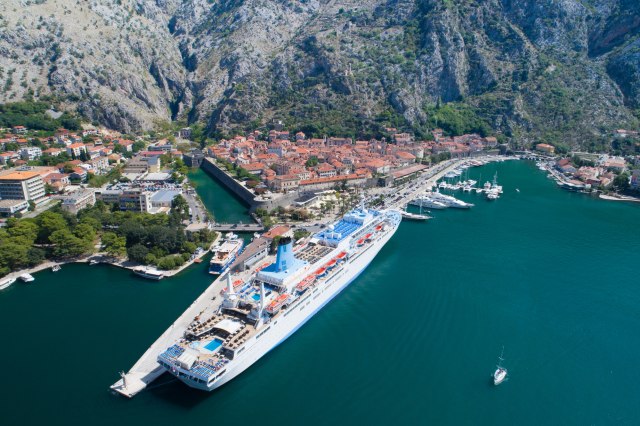
Kotor, Source: b92.net
One of the particular challenges in Boka is the control of the movement of vessels, for which not all the necessary infrastructure is yet in place.
"The Maritime Safety Administration has already taken measures to expand the monitoring of the Bay of Kotor through the IPA 2017 pre-accession assistance program. It is planned to procure and install the missing sensors that will cover the entire bay. These are funds that are not easy to provide; it is not easy to build a system. However, we have enough experience, the project is already underway, and we hope that at the beginning of 2022, the sensors will be in place," emphasize Lukšić.
In Boka currently, not counting the marina Luštica Bay, there are four maritime border crossings. It means that yachts and boats do not have to seek free traffic just entering our territorial waters, which Žarko Lukšić explains as a requirement for the development of nautical tourism.
"As safety managers, we have to adapt to that. Three large marinas have been built, one is on the open sea (Luštica Bay), two are in the bay (Porto Montenegro and Porto Novi), and we certainly cannot influence that."
Captain Čavor claims that we should set up the system better:
"We need to dedicate more time and do it professionally. To know when the ship sails into the Bay of Kotor, what are its duties. We must introduce a reporting point, a moment when everyone, absolutely everyone who sails into the Bay of Kotor, must contact anyone, the Port Authority, or Bar Radio, anyone. So, we know that certain vessels have sailed into the Bay of Kotor, and we know what the overall situation is in the bay."
In neighboring Croatia, the system works differently. For example, yachts are not allowed to sail from Boka near Ponta Oštro and head to Dubrovnik. They must register at the entrance port of Cavtat and get free traffic. Why we do not regulate the situation similarly remains an open question.
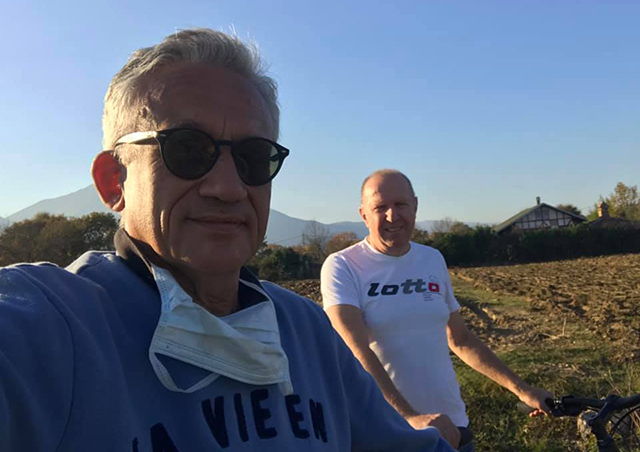
November 23, 2020 - The coronavirus epidemic has had a devastating effect on the female population in Montenegro, according to a study by the United Nations Development Program (UNDP) "Contribution to the Montenegrin economy and unpaid work and care," which covered the period of the first wave from February to June.
A large number of women lost their jobs. Their salaries were reduced, especially in the private sector.
Traditionally, women in Montenegro participate much more in unpaid work and household care than men, which is an additional problem for economic gender equality.
"The number of unemployed women increased by 3,560 from the end of February to the end of June. That is the majority of the total number. So another official fact is that more women than men lost their jobs," said Milos Vukovic, the author of the research.
"The largest increase in unemployed women is in the category of 31 to 40 years, almost a thousand less employed women. As you can see, COVID19 hit the younger female population the hardest," Vukovic pointed out.
The following data does not leave room for optimism either.
"The category of unemployed women looking for work for up to a year, meaning the number of short-term unemployed, has risen by almost 40 percent. It is just the beginning of the COVID19 impact, February-June. We can expect this situation to be even worse next year," he said. Vukovic.
The drop in net earnings for the four months of the virus's operation totals as much as 2.34 million euros.
Here, too, says Vukovic, we have an unequal impact on the female population.
While wages fell in the area of accommodation, agriculture, and trade, there was an increase in health care.
"Private individuals and private companies fired workers, especially women, much faster than women who were in the public sector," Vukovic said.
Society cannot function without unpaid work and care in the household. However, in Montenegro, women are in the lead because as many as 90 percent of them spend at least one hour a day in unpaid care.
"Women earned 122 million euros in cash in three months of the pandemic. That's not money - we expressed in money the value of unpaid work and household care, which is as much as 92 percent more than men," said Danijela Gasparikova, UNDP Resident Representative in Montenegro.
It is estimated that a woman born in Montenegro will spend at least eight years of her life doing unpaid work.
The UNDP warns that the data are an alarm for decision-makers.
TV Vijesti on UNDP research:
Text by Danilo Ajkovic
November 21, 2020 - The first volume of the edition "Monumenta Montenegrina Vaticana", published by historians Slavko Burzanović and Boban Batrićević, has been published by the Ministry of Culture. It is a valuable collection of documents on the Concordat of the Principality of Montenegro and the Holy See from 1886. "Monumenta Montenegrina Vaticana" is a capital work that testifies to the long and rich history of our state, law, and culture in the broadest sense of the word.
The Ministry of Culture, with the help of the Embassy of Montenegro at the Holy See, recognized the importance of cooperation with the Vatican Archives and took steps to pave the way for Montenegrin researchers. The result of these efforts is the first book from the edition "Monumenta Montenegrina Vaticana", which is a documentation of the agreement between the Principality of Montenegro and the Holy See that regulates the position of the Catholic community in Montenegro. This rare act of an Orthodox monarchy speaks of the modernity of the political thought of King Nikola, who laid the foundations of coexistence with others - said the Minister of Culture, Aleksandar Bogdanović.
He assessed that this edition is the best proof of the inter-confessional relations on which Montenegro rested and on which it should rest still today.
"Illuminating the paths of existence is a duty and a privilege for every researcher and institution. Only a clear picture of who we were allows us to complete the Montenegrin mosaic and answer the questions of who we are today. This book is not only a documentary presentation of the development path of signing the agreement between the two sovereign states but also a confirmation of the development of diplomacy," Minister Bogdanović pointed out.
The edition, prepared in honor of almost 120 years since the contractual relations between the two independent states, as he emphasized, deserves the attention not only of professional and academic circles but also of the wider lay audience.
Everyone will find in it something new and unknown, a tile that proves or refutes the basic assumptions, but also a broader picture of the depth of relations between two different states. A careful reader, leafing through the pages of this book, will better understand the essence of Montenegrin freedom, under whose light there was enough space for everyone. On the other hand, this project speaks of awareness of the importance of collecting historical material about Montenegro in foreign archives, which begins to eliminate a shortcoming in the research of our past - said Bogdanović.
"The book "Monumenta Montenegrina Vaticana" is the first in a series of editions to be printed by the Ministry of Culture, as well as other Montenegrin scientific and cultural institutions, in the coming period. It is worth mentioning that Montenegro is very present in all three major Vatican archives - in addition to the Vatican State Archive and the Fide Propaganda Archive, there is also the Apostolic Archive, which until recently was usually called the "Secret Archive." Accordingly, working with rich documentation will be a challenge for Montenegrin historians and archivists for many years to come.
The organizers consulted material from the archives of Propaganda Fide and material from other funds of the State Archives, as well as material from the State Archives of Montenegro, the Archives and Library Department of the National Museum of Montenegro, and the archives of the Bar Archdiocese. The collection is the result of the collective engagement and cooperation of a large number of people, and the creation of the work in a relatively short time would not have been possible without the organizational support of the Embassy of Montenegro at the Holy See. We especially emphasize the activity of the Director of the State Archives in the Vatican, Dr. Johannes X, whom we thank on this occasion for his exceptional attention and support. All this was possible thanks to the Secretary of the Holy See for Relations with States, Monsignor Paul Gallagher. His kindness gave us access to the Vatican archives, which was another expression and confirmation of the excellent relations between Montenegro and the Holy See."
The organizers of the edition expressed special gratitude to the Minister of Culture Aleksandar Bogdanović as he initiated and supported the realization of this long-term project, which represents the first step in systematic research and publication of material from the Vatican archives related to the history of the Montenegrin state.
The coronavirus pandemic made it impossible for us to present this significant edition, printed by Cetinje's "Obod," earlier in both Montenegro and the Vatican. We hope that the presentation of the book "Monumenta Montenegrina Vaticana" will be organized with the participants when the conditions make it possible, as this is what the work certainly deserves," reads the Ministry of Culture's statement.
Source: RTV Cetinje
November 20, 2020 - The rights of children in Montenegro are generally respected, although there is still room for improvement, according to Snezana Mijuskovic, Deputy Protector for the Rights of Children, Social Welfare and Youth. On the occasion of International Children's Day, November 20, Mijušković pointed out that, unfortunately, there are still differences in the exercise of these rights in the north, south, and central parts of the country.
"No matter where they live, kids should enjoy the same rights. That is why we have implemented many activities in the previous period to raise children's awareness of their rights to a higher level and educate them on who to turn to in situations when they think that their integrity is threatened, "said Mijuskovic in a statement for Radio Bijelo Polje.
She points out that there is room for progress in almost all areas, and of particular importance, as she emphasized, are education, health care, and access to various services.
"All life issues are of great importance, but the problem of poverty and social exclusion is something that should be under the watchful eye of all institutions. Also, protecting kids who belong to vulnerable groups is especially important, whether they be children with disabilities or those from minority communities. Children of the Roma community specifically have many problems, including those related to their living conditions, that lead to the poorer exercise of their rights, stated the Deputy Protector for the Rights of Children, Social Welfare, and Youth.
What distinguishes this year from all previous ones, according to Mijušković, is the situation in which the whole world has found itself, being that of the coronavirus pandemic.
The coronavirus pandemic has made it impossible for children to exercise their rights in the way they did before. According to Mijušković, the epidemic showed shortcomings in certain areas, and they are especially visible, as she said, in the field of education.
"Despite the Ministry of Education and educational institutions' great engagement to ensure the quality functioning of the educational system, numerous shortcomings have been noticed. The transition to online teaching is a novelty that we have all faced and complicates the situation when it comes to education. The particular problem is that not all children have equal access to the Internet, not all technical means, computers, mobile phones, and other devices to follow classes. Printed materials are indeed being delivered to those children, but in practice that puts those pupils in an unequal position," underlined Mijušković.
Source: Radio Bijelo Polje
November 19, 2020 - The celebration of the feast of Our Lady of Health, November 21, which in Boka is celebrated not only by Catholics but also by believers of other confessions, is a real example of this area's ecumenical characteristics.
On the same day, Orthodox believers celebrate the day of the Holy Archangel Michael, and Kotor and Tivat commemorate the Municipality's Day in honor of their liberation from the occupying power in the Second World War. It is unlikely that Our Lady of Health will impact the epidemiological situation on her day, but this year it may be more than usually relevant to recall her cult in Boka, which arrived through Venice.
The cult of Our Lady of Health is related to the plague epidemic that reigned in the Middle Ages, which killed many people and devastated the economy. The health and economic situation in the context of the time is therefore in some ways comparable to our current circumstances. Then, Venice asked the Mother of God for help, and when the plague stopped, the Senate decided to build a church on the Grand Canal called Santa Maria Della Salute, i.e., Our Lady of Health, for the Blessed Virgin Mary, who pulled Venice out of its horror.
The cult spread to Dalmatia, where one of the most beautiful churches of Our Lady of Health was built in Zadar. Later history connected it with Boka - Vicko Zmajević from Perast built a central altar in the 18th century, which still adorns this church. Churches of Our Lady of Health exist in Split, Dubrovnik, and Kotor.
The Church of Our Lady of Health at the Fortress of San Giovanni in the minds of the citizens of Kotor then, and today, remains extremely important and is a kind of pilgrimage church that is part of the collective consciousness of the whole of Kotor and the Bay.
"This is still one of the most beloved shrines of Our Lady in the Diocese of Kotor. On the feast of Our Lady of Health on November 21, hundreds of believers make a pilgrimage there, which is a lot considering that this does not include those who want to, only those who can"- it was pointed out on the occasion of the promotion of the book "Kotor Votive Shrine of Our Lady of Health" by the late Vicar of the Kotor Diocese, Don Anton Belan.
The Church of Our Lady of Health in Kotor, located halfway to San Giovanni, dates from the 15th century but was rebuilt over time. It is first mentioned in archival documents in 1518.
It has a deep open narthex in the shape of a Gothic arch and is vaulted with a Gothic vault. The rest of the building belongs to the Baroque period. It has a small gothic rosette on the front. The entrance door is made of wrought iron and was mentioned as early as 1745. The Church of Our Lady of Health has modest dimensions of 9.75 x 4 m, and the narthex 3.06 x 4.65 m. It is paved with red and white stone from Đurić near Kamenar, from which part of the pavement in the church of St. Mark in Venice was built. The church has a sacristy with a stone vault, mentioned in the 18th century. Five steps raise the altar space.
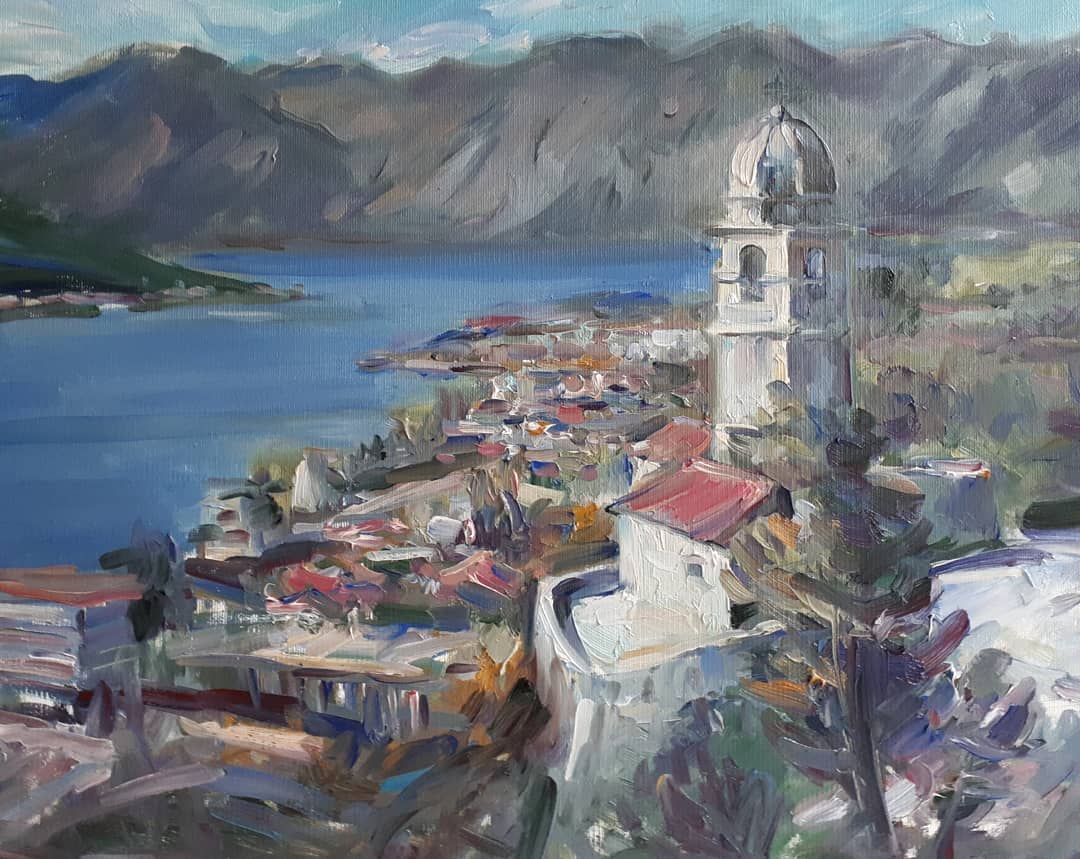
Our Lady of Health Church, Painting by Nedeljko Simanić
The Church of Our Lady of Health watches over the city, completing nature and man's magnificent architecture. The bell tower was completed on March 10, 1727, when Bishop Hyacinth Zanobetti gave St. Gaudencia and Veneranda relics to be placed at the foot of the cross of the bell tower. The bell tower contains three bells made in 1930 in the famous bell foundry De Poli from Vittorio Veneta (Italy), founded in 1453. The bell tower is 18 meters high with a newly erected cross. It has an octagonal stone dome with prominent ribs.
The church is dedicated to the Presentation of the Blessed Virgin Mary in the temple. It is celebrated in a particular way as Our Lady of Health on November 21. In the church, there is the tomb of the famous Kotor family Bolica, and under the narthex is the tomb of another Kotor citizen, Count Anton Luković.
The Church of Our Lady of Health can be reached by a picturesque path that is adorned by four small chapels, with 520 steps to climb.
"The Church of Our Lady of Health warned, and in a way still does today, that the mighty walls and courage of the defenders alone are not enough to protect the city, but God's protection is also needed with her motherly intercession," the Kotor diocese said.
At the end of this story of the famous sanctuary of Boka's people, we can indeed tell you: whether you are believers or not, whether on the occasion of November 21 or at some other time - head to San Giovanni and find this church. While enjoying the atmosphere of Our Lady of Health's spacious porch, in the archives also called Our Lady of Rest, you can appreciate one of the most beautiful views of the Bay of Kotor. It is also an opportunity to pause for a moment to feel the history of the ancient city and its citizens' destiny through time.
Cities with archives that preserve the teachings of centuries, such as Kotor, know that ugly times come and go. Kotor has defeated numerous epidemics in the past. Some will say this is thanks to the intercession of Our Lady of Health. If that is indeed true, may her feast bring us some help also this year.
Source: Kotor Diocese
November 18, 2020 - The Ambassador of the Republic of Italy to Montenegro, HE Luka Zelioli, at the invitation of the President of the Municipality Zeljko Komnenovic, visited Tivat and talked with the new local government about strengthening bilateral cooperation.
"You are the first foreign Ambassador to visit Tivat since the change of government, and I thank you for that. I must note that Tivat and Boka's connection with Italy through history and tradition is more than evident. I hope to create stronger ties, which will result in concrete examples of international cooperation, especially in the field of culture." Tivat Mayor Zeljko Komnenovic pointed out the special importance of a larger presence of Italian investors "to strengthen our ties, especially in the sphere of tourism."
Ambassador Zelioli thanked the mayor for recalling Italy's particular connection with Boka, which has seen an increase in the number of Italian tourists visiting the area in recent years. He pointed out the intensive cooperation in the fields of culture between the Embassy and the Community of Italian Montenegro in the Bay of Kotor's towns. He expressed strong interest in intensifying cultural cooperation with the Municipality of Tivat, confirming the readiness of the first initiative. Zelioli highlighted the importance of the presence of small and medium-sized Italian companies in Tivat and suggested strengthening economic cooperation in spheres of common interest.
Bearing in mind that Italy will co-chair the 26th Conference of the States Parties to the United Nations Framework Convention on Climate Change - COP 26 in the coming years, this country is paying special attention to environmental protection and economic sustainability activities. When it comes to Boka, their particular interest is in the sphere of public maritime transport.
The reception was also attended by the President of the Municipal Assembly of Tivat, Dr. Andrija Petković, who pointed out that the coastal part of Montenegro, especially Boka and the Italian coast, share a similar mentality. "We love Italian fashion, "Calcio," San Remo festival . Many Italians have significantly contributed to the work of the Boka Navy. The people of Tivat still remember the old Italian doctors who worked in our city," said Dr. Petkovic. He expressed his wish that the Italian Community in Montenegro improve cooperation with the Municipality of Tivat and organize cultural events in the city.
The Vice-President of the municipality, Goran Božović, recalled the two twinning projects that Tivat has with the Italian cities of Mola di Bari (from 1969) and San Giacomo Delle Schiavoni (from 2007), which should be revitalized. "I would also like to highlight the Tivat International Carnival cooperation with carnivals from the region of Veneto, Emilia-Romagna, and Lombardy. As Mediterranean countries, we share similar features of cultural heritage. Such collaboration brings people and countries closer; I am sure that there is a lot of room for concrete cooperation when it comes to international projects, "said Bozovic.
Ambassador Zelioli recalled the success of many EU-funded initiatives, citing the example of the Italy-Albania-Montenegro Interreg IPA cross-border program, which covers the two Italian regions of Pula and Molise. He pointed out the opportunities that such a program can provide to municipalities like Tivat, with active participation and project proposals. The Municipality of Tivat has successfully nominated projects in the past period within this program.
The President of the municipality, Zeljko Komnenovic, announced that Boka's towns and cities would act together in the future to increase the chances for better visibility of all activities, and thus increase the opportunities for the success of candidate projects.
November 17, 2020 - UNICEF Goodwill Ambassador to Montenegro Antonije Pusic, better known as Rambo Amadeus, reminds us that today in Montenegro, a real example of chivalry and heroism is wearing a mask and keeping a distance from others.
"Whenever we don't want to put on a mask and keep our distance from our interlocutor, we should remind ourselves of chivalry. The noblest trait of all, by which we protect others from ourselves, regardless of whether they are our friends, parents, brothers, relatives, or someone utterly unknown," explains Antonije Pusic.
He points out that the crisis with the coronavirus epidemic has been going on for too long. That is why we are all upset, on edge, and that our psyche is defending itself by not wanting to accept the factual situation. According to Pusic, the longer the epidemic lasts, the less we want to believe in the facts, suppress them, in the hope that the coronavirus and all the story around it will disappear overnight.
"I am also terribly bored with all this, but I am aware that I have to be civilized, if not for myself, then certainly for the dear people around me," says Pusic.
Suppose we feel completely healthy and have no symptoms. In that case, we are often not even aware of being infected. So wearing a mask and keeping our distance protects others from ourselves so that they do not become infected and suffer consequences that can be much more serious than for us," empasizes Antonije Pusic.
"So, when someone does not wear a mask and does not keep his distance, he does not behave heroically. He does not protect himself from others, but also his behavior can never be chivalrous because he does not protect others from himself," concludes Pusic.
According to the latest public opinion poll conducted by Ipsos in October, with UNICEF's support and the British Embassy in Podgorica, most citizens apply one of the #RazmakMaskaRuke measures, but not all three at the same time, as recommended, according to a UNICEF statement.
"The percentage of people who say they wear a mask rose from 25 percent in March to 81 percent in October, while the percentage of people who say they keep a distance of 1-3 meters during a conversation remained the same - 83 percent. However, people who say they apply all the three measures #DistanceMaskHands are still a minority - only 48 percent of people," the announcement states.
Public opinion polls on coronavirus and comparison of data over time are available on the UNICEF Montenegro website.






